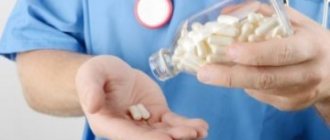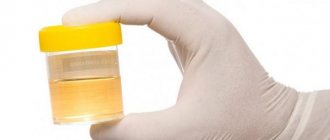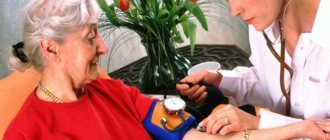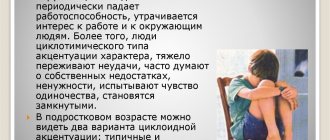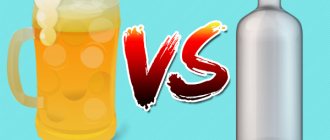Vegetative vascular dystonia manifests itself with a wide variety of symptoms. The disease leads to an imbalance in the functioning of the autonomic nervous system. Because of this, the patient's condition greatly worsens. The problem is not considered life-threatening for the patient, but it significantly reduces its quality. The course of treatment for the disease includes many techniques. Diet, adjustment of the daily routine, treatment of panic conditions, and always medications and tablets for vegetative-vascular dystonia are used.
Medicine for VSD
With a correct diagnosis of VSD, the medications listed in the table help to maintain a healthy lifestyle.
| Name | Action | Indications | Contraindications | Dose |
| Persen | Calming, relaxing | Sleep disturbance, nervousness, anxiety | Hypotension, gallstones, pregnancy | 2-3 tablets per day or 2 before bedtime |
| Cerakson | Improves memory, increases activity | VSD after traumatic brain injury | Increased parasympathetic tone (hypotension, low pulse) | 500-1000 mg per day |
| Cavinton (vinpocetine) | Improves cerebral blood flow | Headache, dizziness, VSD during menopause | Heart rhythm disturbances, bleeding, angina pectoris | 1 tablet 3 times a day |
| Cinnarizine | Relaxes the blood vessels of the brain and limbs | Dizziness, leg vascular spasms | Intolerance | 1 tablet 3 times a day |
| Fezam | Improves memory, attention, cerebral circulation | Headache, dizziness, VSD after skull injury | Kidney diseases, increased excitability | 1 capsule 3 times a day |
| Nootropil | Normalizes brain function, | Memory loss, dizziness | Cerebral hemorrhage, renal failure | 1-2 capsules 3 times a day |
| No-shpa | Relieves spasms | For stomach pain, headache | Intolerance | 1-2 tablets 1-2 times a day |
| Neuro-multivit | B vitamins | Regulates the functioning of the nervous system | Pregnancy, heart failure | 1 tablet 1-3 times a day |
Each drug has its own contraindications.
None of these medications, with the exception of Persen, are prescribed for VSD as the main remedy. Some popular drugs, for example, Aspirin, have absolutely no effect on the course of this disease.
We recommend reading the article about VSD and panic attacks. From it you will learn about vegetative-vascular dystonia and the causes of panic attacks, symptoms, methods of diagnosis and treatment. And here is more information about mixed type dystonia.
Mixed type medications for VSD
For VSD of mixed type, drugs are used that normalize the functioning of the nervous system:
- sedatives - Persen, Novo-Passit;
- restoring sleep - Melaxen, Glycine, Nervo-heel;
- B vitamins – Neuromultivit, Milgamma;
- vegetotropic – Bellaspon, belladonna tincture.
For heart pain, they are supplemented with herbal tinctures: hawthorn, valerian, peony, mint. If such drugs do not give the required result, then the neurologist can strengthen them with antidepressants of plant origin (Deprim, Dormiplant) or synthetic (Venlafaxine, Paroxetine).
It is important to consider that any drug therapy for VSD does not provide a sustainable improvement in the condition. Therefore, there are often cases when a patient has been treated for years by different specialists, takes a large number of pills, and the condition remains the same or even worsens. The reasons for this in adults are:
- lack of physical activity;
- stressful conditions;
- lack of sleep;
- irregular work;
- smoking, frequent drinking of alcohol;
- nutrition is irregular, with a predominance of sweets, flour, fatty and spicy foods, excess coffee and tonic drinks.
For children, and especially adolescents, the following come to the fore:
- mental fatigue;
- passion for electronic gadgets;
- chronic infections;
- conflicts in the family, educational institution.
If the provoking factor is not identified and eliminated, and the daily routine, nutrition and physical activity are not normalized, then medications will not help.
According to hypotonic
For VSD of the hypotonic type, along with non-drug methods, the following drugs are used:
| Group of drugs | Titles |
| Adaptogens | Tincture of lemongrass, eleutherococcus, ginseng |
| Toning, activating | Pantogam, Enerion |
| Nootropics | Piracetam, Phenotropil |
| Carnitine | Lecarnita, Cardonat |
For general weakness and lethargy, use vitamins with minerals and tonic components: Vitrum Energy, Alphabet Energy, Pharmaton.
According to hypertensive
If VSD occurs with an increase in pressure - of the hypertensive type, accompanied by rapid heartbeat, pain in the heart area, then the following is prescribed:
- angiotensin-converting enzyme inhibitors - Enap, Capoten;
- sartans – Teveten, Diokor;
- beta blockers – Anaprilin, Metoprolol;
- tranquilizers – Adaptol, Atarax;
- heart drops - Corvalol, Valocordin.
Expert opinion
Alena Ariko
Expert in Cardiology
It is extremely important to start therapy with the very minimum dosages; if necessary, they are increased very gradually, since patients have a tendency to sharp drops in blood pressure.
Neuroleptics
Antipsychotics are intended for the treatment of persons with mental disorders and psychoses. Such drugs for VSD are prescribed when the disease is accompanied by depression, anxiety, and neurosis. Their action is multifaceted: they reduce the reaction to external stimuli, calm, weaken psychomotor agitation and tension, suppress fear and aggressiveness.
Such medications normalize vascular tone, heart rate and blood pressure. Some of them, in addition to the indicated effect, have a sedative or, conversely, an activating effect.
Neuroleptics are the next step after the use of sedatives. They can only be taken as prescribed by a doctor. In this case, only those drugs that have a mild effect are used. These include:
- Sonapax;
- Truxal;
- aminazine;
- tizercin;
- melleril;
- frenolone.
Groups of drugs for vegetative-vascular dystonia
For the treatment of vegetative-vascular dystonia in women and men, the following groups of drugs are indicated:
- vegetative stabilizers (tranquilizers) – Tenoten, Afobazol;
- vegetative correctors – Sermion, Anaprilin, Bellataminal;
- herbal soothing - Persen, Alora;
- vasodilators – Cavinton, Cinnarizine;
- neuroleptics – Eglonil, Teralijden;
- sedatives - Corvalol, Barboval.
Tranquilizers, vegetative stabilizers
Vegetative stabilizers (tranquilizers) simultaneously reduce the activity of two parts of the autonomic nervous system. Sympathetic tone decreases, and the following symptoms weaken:
- anxiety,
- panic attacks,
- tachycardia,
- high blood pressure,
- hot flashes,
- hand trembling.
With a decrease in parasympathetic (vagal) influences, the intensity decreases:
- shortness of breath,
- heart rhythm disturbances,
- sweating,
- stomach ache,
- diarrhea,
- feelings of weakness,
- darkening in the eyes.
Basic agents that combine a tranquilizing effect with a vegetative stabilizing effect:
- Grandaxin,
- Gidazepam,
- Tenoten,
- Afobazol,
- Phenazepam.
Vegetotropic, vegetative correctors
Drugs that have an isolated effect on one of the parts of the autonomic nervous system are classified as vegetotropic, or vegetocorrectors. To reduce the activity of the sympathetic department (adrenaline effects), the following is prescribed:
- non-selective beta-blockers - Atenolol, Anaprilin;
- sympatholytics (only in severe forms) - Pirroxan, Raunatin;
- increasing parasympathetic tone, vasodilators - Nicergoline, Sermion.
If the activity of the vagus nerve predominates, blood pressure and pulse are low, then use:
- products with belladonna - Bellataminal, Atropine, Sedative PC;
- adrenoreceptor stimulants – Mezaton;
- tonic – ginseng extract, Pantocrine.
Plant-based sedatives for VSD
Sedatives for VSD with natural composition belong to the most widely used group. They have a mild relaxing effect combined with the absence of a pronounced inhibitory effect or a sharp drop in pressure. They use drugs that contain:
| Components | Drugs |
| Hawthorn extract | In tablets, drops Herboton, Doppelgerts active cardiovital, Hawthorn forte, Sedoflor |
| Motherwort | Tincture, Motherwort forte, Motherwort premium |
| Valerian | Extract in tablets, drops, Noxon, Aluna, Antistress |
| Passionflower | Alora, Novo-passit, Persen |
Vasodilators
Vasodilators are prescribed for spasms of the arteries of the brain, which manifest themselves in the form of headaches, dizziness, flashing spots before the eyes, and fainting. They are also effective for peripheral circulatory disorders - chilliness and tingling in the limbs, numbness.
Drugs that affect vascular tone in VSD include:
- periwinkle extract – Cavinton, Vinpocetine;
- ginkgo biloba – Bilobil, Tanakan;
- calcium antagonists - Cinnarizine, Phezam, less commonly Corinfar.
Neuroleptics
Neuroleptics are a group of drugs with a pronounced antipsychotic effect. If they are used for VSD, then only for frequent crises (panic attacks, vagoinsular). But it is usually believed that if the patient is not affected by milder sedatives, then he needs to be examined by a neurologist or psychiatrist to clarify the diagnosis. Sonapax, Teraligen, Eglonil can be used in small dosages.
Sedatives
Sedatives for the treatment of VSD are recommended for stressful conditions, sleep disturbances, increased anxiety, increased heart rate, and heart pain. The most widely prescribed are Corvalol, Valocordin, Barboval. With long-term use, they can cause addiction, and when used during the daytime, they reduce the reaction rate, which is dangerous when driving a car or operating machinery at work.
What causes the syndrome?
Vegetative-vascular dystonia can develop due to a number of factors. Such disorders are caused by pathologies of the central nervous system, colds and infectious diseases. In this case, VSD manifests itself against the background of overwork of the body, weakened by stress and the fight against diseases.
Dystonia can be provoked by:
- overwork and stressful situations;
- sedentary lifestyle;
- eating disorder;
- alcohol abuse or frequent smoking;
- hormonal imbalances;
- cardiovascular diseases.
Today, cases of VSD are recorded among 40% of the adult population of the planet.
The rapid pace of life of modern people and the deterioration of the environment create favorable conditions for the development of the syndrome, which is why the number of cases has increased in recent years.
Treatment of VSD in adults with medications
For the treatment of VSD in adults, medications are used in the form of tablets - Persen, Cinnarizine, drops (Valocordin, ginseng extract), less commonly, injections (Kombilipen, Cavinton) and droppers (Actovegin) are used.
What pills help with VSD?
For mixed types of VSD, calming tablets (Persen), sleep-normalizing tablets (Melaxen), and vitamins are used. If the disease is of the hypotonic type, then tonics (Enerion), adaptogens (ginseng), and nootropics (Phenotropil) are prescribed. For hypertension, low doses of Enap or Teveten, Anaprilin are recommended.
Injections and droppers for VSD
If indicated, medications are used for VSD in the form of injections or droppers:
| Group of drugs | Titles |
| Vitamins | Milgamma, Kombilipen |
| Vegetocorrectors during a crisis | Mezaton, Platyfillin |
| To activate metabolic processes in the brain (short courses) | Actovegin, Cerebrolysin |
| Antioxidants | Mexidol, Idrinol |
| Improves cerebral circulation | Cavinton, Pentilin |
Drops
A fairly common dosage form for VSD is drops; they are used for symptomatic treatment - for example, to relieve heart pain or for regular use. Main groups:
- soothing – hawthorn extract, motherwort, valerian, peony tincture, Pumpan;
- tonic – tinctures of Eleutherococcus, zamanikha, aralia, ginseng, Tonginal, Doppelhertz nervotonic;
- cardiac - Tricardin, Valocordin.
Watch the video about the treatment of VSD:
Adaptogens
Adaptogens are drugs that increase the body’s stability and resistance to various adverse environmental factors, such as:
- physical exercise;
- cold or heat;
- toxins;
- harmful chemical compounds;
- viruses and bacteria.
This effect is achieved by increasing the level of adenosine triphosphate, an acid that provides energy for various biochemical reactions occurring in the body. In addition, such products contain powerful antioxidants that are designed to protect cells from damage.
They also stimulate the cardiovascular system and enrich tissues with oxygen. When various damage is detected in the body, adaptogens stimulate the synthesis of proteins that are involved in their elimination.
Preparations in this group are plant-based. The most effective of them are:
- Asian ginseng root. It has an antioxidant, tonic and anti-inflammatory effect, increases intelligence and mental activity.
- Eleutherococcus. The fruits of this shrub increase stamina and stimulate the immune system.
- Ashwagandha. The root of the plant is used for medicinal purposes. It relieves fatigue and anxiety, helping to fight nervous exhaustion. Normalizes the functioning of the thyroid gland.
- Rhodiola rosea. The substances contained in it normalize the level of cortisol in the blood.
- Cordyceps. This is a medicinal mushroom, its use increases endurance and resistance to stress due to the beta-glucans it contains. These substances stimulate the body's immune response.
VSD: drugs for treatment and prevention
With VSD, medications for treatment do not always help relieve symptoms, and if they are prescribed for prevention, then their effectiveness is even less. The main danger of drug treatment is that you can quickly get the opposite of the expected result.
This is due to the fact that the autonomic nervous system consists of two parts - sympathetic and parasympathetic. Normally they are balanced, but with VSD one predominates, but most often they are both in an unstable state. If you suppress one of them, the other is activated in response, which worsens your well-being (example: pressure fluctuations).
The second undesirable reaction to drugs is addiction. If you drink sedatives constantly, then over time it is difficult to do without them, while recovery does not occur, but new symptoms and adverse reactions arise.
Therefore, the most reliable way of treatment and prevention is lifestyle changes:
- quitting smoking and alcohol, drinking coffee;
- daily physical activity, walks in nature for at least an hour are especially useful;
- good sleep;
- eating by the hour;
- stable working hours, refusal of night shifts, overtime, breaks for warm-up during sedentary work;
- massage, reflexology;
- hydrotherapy, electrical procedures.
We recommend reading the article about vascular headaches. From it you will learn about the causes and types of headaches, warning signs, how to diagnose, as well as treatment methods and recommended lifestyle. And here is more information about fainting with vascular dystonia.
Medicines for VSD are used only in combination with lifestyle changes. They use sedatives of plant origin, tranquilizers, and sedatives. Depending on the pressure and type of disease, tonic tinctures or drugs that dilate blood vessels are used.
Antidepressants
Antidepressants have a positive effect on the mental state of a patient with VSD and help get rid of depression. These are psychotropic substances that can alter consciousness and provoke the production of hormones that stimulate brain activity - serotonin, norepinephrine and dopamine.
In the treatment of vegetative-vascular dystonia, antidepressants of 3 groups are used: monocyclic, tricyclic and tetracyclic drugs. The former affect serotonin, a hormone that causes positive emotions. For example, the drug Fluoxetine, which belongs to this group, enhances the effect of serotonin on nerve endings by increasing the duration of production. As a result, the patient's mood improves and his well-being improves.
Tricyclic antidepressants act on 3 types of neurotransmitters: serotonin, dopamine and norepinephrine. The main difference between this group of drugs is their quick effect. Such antidepressants include Clomipramine, Imipramine, Tianeptine.
Tetracyclic drugs inhibit the action of monoamine oxidase (Mianserin, Maprotiline, Pirlindol). This is a special enzyme that destroys mediators that affect the general emotional sphere of a person.
Antidepressants are prescribed in cases where VSD is accompanied by:
- panic attack;
- hypochondriacal disorders;
- neuroses.
The duration of treatment with antidepressant effects with medications is 1 month. In this case, the medicine is used daily. It is prohibited to combine several drugs of this type at the same time.
Vitamins
Vitamin deficiency negatively affects health and complicates the course of diseases. Vegetative-vascular dystonia cannot be ruled out, so they are always included in the list of medications for the treatment of this pathology. It is important to compensate for the lack of vitamins A, B and E, folic, nicotinic and ascorbic acid, pyridoxine.
Deficiency of thiamine or vitamin B1 negatively affects the functioning of the nervous, cardiovascular and digestive systems. Riboflavin (vitamin B2), like pantothenic acid, has a powerful effect on the functioning of the central nervous system and is involved in almost all metabolic processes.
Pyridoxine or vitamin B6, as well as B12, increases the body's resistance to various stressful situations. All the vitamins necessary for vegetative-vascular disorders are presented in such complex preparations as Complivit, Supradin, Pikovit. They are taken in short courses. They are recommended to be combined with taking nootropic drugs. It is advisable to take microelements and beneficial substances for any type of VSD.
Drug therapy
What treatment is recommended for people suffering from VSD? Drugs that can help with this pathology are a huge list of medications. After all, the disease is characterized by too large a list of symptoms.
However, this does not mean that all drugs listed on this list must necessarily be included in the treatment program. It's just the opposite. Prescribing an excessive amount of pharmacological drugs to a patient is the highest sign of doctor incompetence. After all, such an approach will not only not help in curing the disease, but will also significantly worsen the situation. Don’t forget about this if you need treatment for VSD.
Drugs designed to combat both the symptoms of the disease and the disease itself are divided into several groups.
Vitamin complexes
They are quite often included in the treatment of VSD. They are taken for the general health of the body.
Preparations containing B vitamins are effective in combating the disease:
- "Neurobeks";
- "Neurovitan";
- "Neurorubin."
Due to its wide range of symptoms, vegetative-vascular dystonia is not one of those diseases whose presence in a person is easier to determine. Therefore, the range of means designed to combat this disease is quite extensive. Some of the drugs have a dual effect. For example, the drug “Barboval” (a sedative that increases cardiac metabolism) or “Hawthorn tincture” (lowers blood pressure, eliminates chest pain). It is important to remember that all medications must be prescribed by a doctor. Self-medication is inappropriate in this matter.
Symptoms of the disease
- Change in heart rate. The heart can beat both at a high frequency and at a low frequency;
- Periodic appearance of aching pain in the heart;
- Difficulty breathing, feeling of lack of air, shortness of breath with minor exertion;
- The appearance of diarrhea, heartburn, constipation;
- Increased sweating, causeless increase in body temperature;
- Headaches, dizziness;
- Concentration of attention is lost, sleep patterns worsen, arbitrariness of thinking decreases;
Tranquilizers
This is an effective remedy for relieving anxiety, fear and other anxious conditions. The effect of tranquilizers is short-term. Can cause addiction and dependence if used frequently. Therefore, before taking, be sure to consult with your doctor about the dosage and timing of use.
Tranquilizers also have side effects, including decreased concentration and respiratory system disorders.
The following drugs for VSD are widely used: phenazepam, bromazepam, hydroxyzine and others.
4Antidepressants
Amitriptyline
Based on the name of the group of drugs, antidepressants for VSD are prescribed when depressive disorders occur in the disease. Doses of antidepressants must be individualized. Amitriptyline is one of the representatives of antidepressants, prescribed 50-75 mg per day. Amitriptyline is indicated for anxious depression, with episodes of agitation, since amitriptyline also has a calming effect.
Drugs that lower blood pressure
The pathology can develop according to the hypotonic or hypertonic type. Accordingly, in the first case the patient suffers from low blood pressure. Whereas in the second situation the indicators can reach high numbers. When prescribing medications, the doctor must take into account the VSD types.
Treatment to lower blood pressure may include the following medications:
- "Anaprilin";
- "Bisoprolol";
- "Metoprolol."
Natural products will provide good results:
- hawthorn;
- viburnum;
- oregano;
- valerian.
